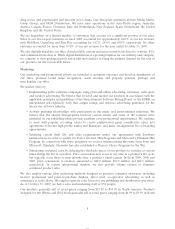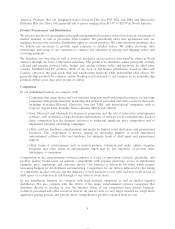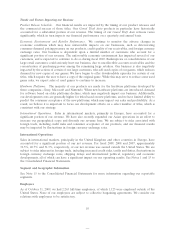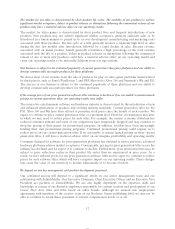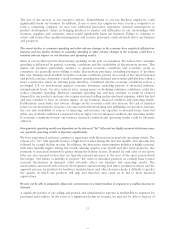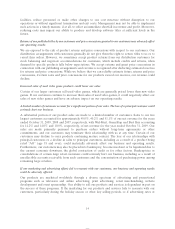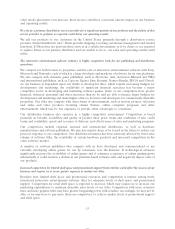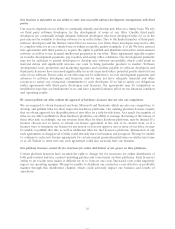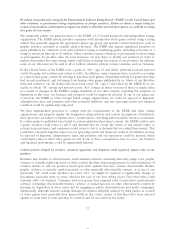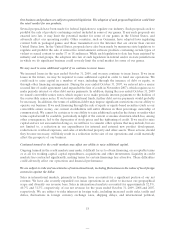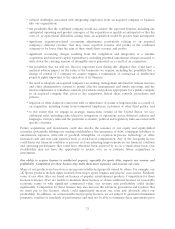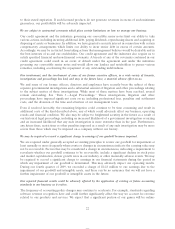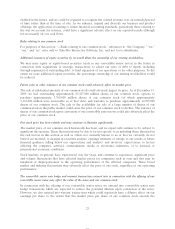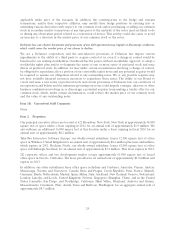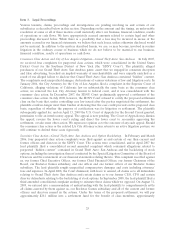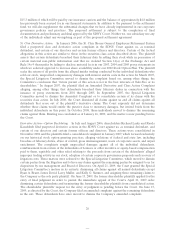2K Sports 2009 Annual Report Download - page 22
Download and view the complete annual report
Please find page 22 of the 2009 2K Sports annual report below. You can navigate through the pages in the report by either clicking on the pages listed below, or by using the keyword search tool below to find specific information within the annual report.We submit our products for rating by the Entertainment Software Rating Board (‘‘ESRB’’) in the United States and
other voluntary or government ratings organizations in foreign countries. Failure to obtain a target rating for
certain of our products could negatively impact our ability to distribute and sell those games, as could the re-rating
of a game for any reason.
We voluntarily submit our game products to the ESRB, a U.S.-based non-profit and independent ratings
organization. The ESRB system provides consumers with information about game content using a rating
symbol that generally suggests the appropriate player age group and specific content descriptors, such as
graphic violence, profanity or sexually explicit material. The ESRB may impose significant penalties on
game publishers for violations of its rules related to rating or marketing games, including revocation of a
rating or monetary fines up to $1 million. Other countries require voluntary or government backed ratings
as prerequisites for product sales. In some instances, we may have to modify our products in order to
market them under the target rating, which could delay or disrupt the release of our products. In addition,
some of our titles may not be sold at all or without extensive edits in certain countries, such as Germany.
In the United States, if the ESRB rates a game as ‘‘AO’’ (age 18 and older), platform licensors may not
certify the game and retailers may refuse to sell it. In addition, some consumers have reacted to re-ratings
or controversial game content by refusing to purchase such games, demanding refunds for games that they
had already purchased, and refraining from buying other games published by us. Many of our Rockstar
titles and certain of our 2K Games titles have been rated ‘‘M’’ (age 17 and older) by the ESRB. If we are
unable to obtain ‘‘M’’ ratings and instead receive ‘‘AO’’ ratings on future versions of those or similar titles
as a result of changes in the ESRB’s ratings standards or for other reasons, including the adoption of
legislation in this area, our business and prospects could be negatively affected. If any of our games are
re-rated by the ESRB or other foreign based ratings organizations, we could be exposed to litigation,
administrative fines and penalties and other potential liabilities, and our operating results and financial
condition could be significantly impacted.
We have implemented processes to comply with the requirements of the ESRB and other ratings
organizations and properly display the designated rating symbols and content descriptions. Nonetheless,
these processes are subject to human error, circumvention, overriding and reasonable resource constraints.
If a video game we published were found to contain undisclosed pertinent content, the ESRB could re-rate
a game, retailers could refuse to sell it and demand that we accept the return of any unsold copies or
returns from customers, and consumers could refuse to buy it or demand that we refund their money. This
could have a material negative impact on our operating results and financial condition. In addition, we may
be exposed to litigation, administrative fines and penalties and our reputation could be harmed, which
could impact sales of other video games we sell. If any of these consequences were to occur, our business
and financial performance could be significantly harmed.
Content policies adopted by retailers, consumer opposition and litigation could negatively impact sales of our
products.
Retailers may decline to sell interactive entertainment software containing what they judge to be graphic
violence or sexually explicit material or other content that they deem inappropriate for their businesses. If
retailers decline to sell our products based upon their opinion that they contain objectionable themes,
graphic violence or sexually explicit material or other generally objectionable content, or if any of our
previously ‘‘M’’ rated series products are rated ‘‘AO,’’ we might be required to significantly change or
discontinue particular titles or series, which in the case of our best selling Grand Theft Auto titles could
seriously affect our business. Consumer advocacy groups have opposed sales of interactive entertainment
software containing objectionable themes, violence or sexual material or other objectionable content by
pressing for legislation in these areas and by engaging in public demonstrations and media campaigns.
Additionally, although lawsuits seeking damages for injuries allegedly suffered by third parties as a result
of video games have generally been unsuccessful in the courts, claims of this kind have been asserted
against us from time to time and may be asserted and be successful in the future.
17



